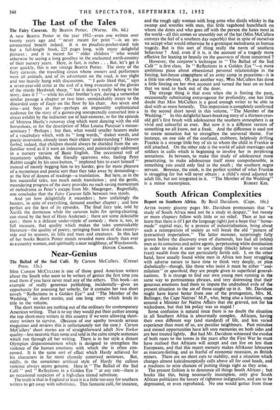Near-Genius
Miss CARSON McCuLLEas is one of those good American writers about the South who seem to be writers of genius the first time you read them if you have never read any of the others. This book—an example of really generous publishing, incidentally—gives an opportunity for assessing her soberly, for it contains her two short novels "Reflections in a Golden Eye" and "The Member of the Wedding," six short stories, and one long story which lends its title to the volume.
The short stories are nothing out of the ordinary for contemporary American writing. That is to say they would put their author among the top short-story writers in this country if we were allowing short- story writers to survive. (Because of our apathy towards serious magazines and reviews this is unfortunately not the case.) Carson McCullers' short stories are of straightforward adult New Yorker quality—less neurotic than some and told in the calm simple sentences which run through all her writing. There is in her style a distant Olympian dispassionateness which is designed to strengthen the violence of the human emotions with which she is often con- cerned. It is the same sort of effect which Hardy achieved for his characters in far more clumsily contrived sentences. But, oddly, in the sometimes artificial style of Hardy the callous violence always seems genuine. Here in " The Ballad of the Sad Café " and " Reflections in a Golden Eye " at any rate—there is an occasional suspicion of a high-class tinned substitute.
The truth is that in England at least it is a little too easy for southern writers to get away with substitutes. This fantastic café, for instance, and the rough ugly woman with long arms who distils whisky in the swamp and wrestles with men, this little vagabond hunchback on whom she dotes and who goes off with the person she hates most in the world—all this comes so smoothly out of the hat (Miss McCullers conveys the feel of a southern day superbly) that in spite of ourselves we accept what would otherwise be a grotesque melodrama as human tragedy. But is this sort of thing really the norm of southern behaviour ? And, even if it is, is the account of a tragedy more effective for leaning so heavily on the queerness of those concerned ?
However, the conjuror's technique in " The Ballad of the Sad Café " is first class. In " Reflections in a Golden Eye "—a more ambitious piece about obsessional personal relationships in the forcing, hot-house atnnsphere of an army camp in peacetime—it is a little too obvious. Or, put another way, Miss McCullers has done a little forcing on her own account and turned the heat on so hard that we tend to back out of the door.
The strange thing is that even when she is forcing the pace, occasionally substituting extravagance for profundity, one has little doubt that Miss McCullers is a good enough writer to be able to deal with us more honestly. This impression is completely confirmed in the second short novel in this volume, "The Member of the Wedding." In this delightful heart-breaking story of a thirteen-year- old girl's first brush with adolescence the southern atmosphere is as vivid and colourful as ever. But now it is a different version of something we all know, not a freak. And the difference is used not to create sensation but to strengthen the universal theme. For instance, on one side of the confused, stubborn, helplessly drifting Frankie is a strange little boy of six to whom the child in Frankie is still attached. On the other side is the world of adult marriages and soldiers in cafés which is beginning to involve her in perplexing sensations. In between, to make this study of adolescence more penetrating, to make adolescence itself more comprehensible, is something you could only find in the south ; the southern negro servant. Berenice, the cook, is the perfect symbol of what Frankie is struggling for but will never obtain : a child's mind adjusted to adult life, but not integrated in it. "The Member of the Wedding"


































 Previous page
Previous page